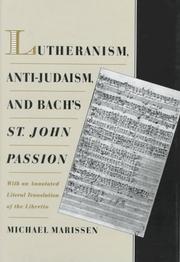Check nearby libraries
Buy this book

Bach's St. John Passion is surely one of the monuments of Western music, yet performances have become inevitably controversial. In large part, this is the result of the combination of powerful, highly emotional music coupled with a text that includes passages from a gospel marked by vehement anti-Judaic sentiments. What did this masterpiece mean in Bach's day, and what does it mean today?
Although the bibliographies on Bach and on Judaism have grown enormously since World War II, there has been very little work on the relationships between these two areas. This is hardly surprising; writers focusing on issues of anti-Semitism often lack musical training and are, in any event, interested in more pressing social and political issues. Bach scholars, on the other hand, have mostly concentrated on narrowly defined musical topics.
And strangely, almost no scholarly attention has been given to the relationships between Lutheranism and Judaism as they affect the St. John Passion. Through a reappraisal of Bach's work and its contexts, Michael Marissen confronts Bach and Judaism directly, providing interpretive commentary that could serve as a basis for more informed and sensitive discussions of this troubling work.
Consisting of a long interpretive essay, followed by an annotated literal translation of the libretto, a guide to recorded examples, and a detailed bibliography, this concise text provides the reader with the tools to assess the work on its own terms and in the appropriate contexts. The discussion centers first on the principal messages of the St. John Passion: Jesus' identity, his work, and how this affects the lives of his followers.
Marissen goes on to suggest that fostering hostility toward Jews is not the subject or purpose of Bach's setting. For those who would reduce Bach's powerful work to its artistry, and for those listeners who find Bach's music deeply meaningful but may not have considered its attendant religious and cultural issues, as well as for those who assume the work essentially teaches contempt for Jews, Marissen aims to show that confronting the St. John Passion is more problematic than they think. The result is an ethically intelligent, carefully reasoned discussion of one of Western music's greatest works of art.
This book is designed for both general readers and scholars.
Check nearby libraries
Buy this book

Previews available in: English
Subjects
Bible, Judaism, Librettos, Luther, Lutheran Church, Oratorios, Passion, Relations, Role of Jews, Versions, Bach, johann sebastian, 1685-1750, Jesus christ, passion, Bible, versions, Judaism, relations, MUSIC, Instruction & Study, Voice, Printed Music, Piano-Vocal-Guitar, Interfaith relations, Jewish role in the Passion of Jesus Christ, Johannespassion (Bach, Johann Sebastian)| Edition | Availability |
|---|---|
|
1
Lutheranism, Anti-Judaism, and Bach's St. John Passion: With an Annotated Literal Translation of the Libretto
1998, Oxford University Press, Incorporated
in English
0195344340 9780195344349
|
zzzz
Libraries near you:
WorldCat
|
|
2
Lutheranism, Anti-Judaism, and Bach's St. John Passion: With an Annotated Literal Translation of the Libretto
1998, Oxford University Press
in English
1280454083 9781280454080
|
zzzz
Libraries near you:
WorldCat
|
|
3
Lutheranism, anti-Judaism, and Bach's St. John Passion: with an annotated literal translation of the libretto
1998, Oxford University Press
in English
019511471X 9780195114713
|
aaaa
Libraries near you:
WorldCat
|
|
4
Lutheranism, anti-Judaism, and Bach's St. John Passion: with an annotated literal translation of the libretto
1998, Oxford University Press
in English
|
zzzz
|
Book Details
Edition Notes
Includes discography (p. 77), bibliographical references (p. 87-98), and indexes.
Classifications
The Physical Object
ID Numbers
Source records
Scriblio MARC recordLibrary of Congress MARC record
Ithaca College Library MARC record
marc_openlibraries_sanfranciscopubliclibrary MARC record
Internet Archive item record
amazon.com record
Better World Books record
Library of Congress MARC record
marc_columbia MARC record
marc_columbia MARC record
marc_columbia MARC record
Community Reviews (0)
Feedback?| July 13, 2024 | Edited by MARC Bot | import existing book |
| January 7, 2023 | Edited by MARC Bot | import existing book |
| August 4, 2020 | Edited by ImportBot | import existing book |
| December 4, 2010 | Edited by Open Library Bot | Added subjects from MARC records. |
| December 10, 2009 | Created by WorkBot | add works page |









